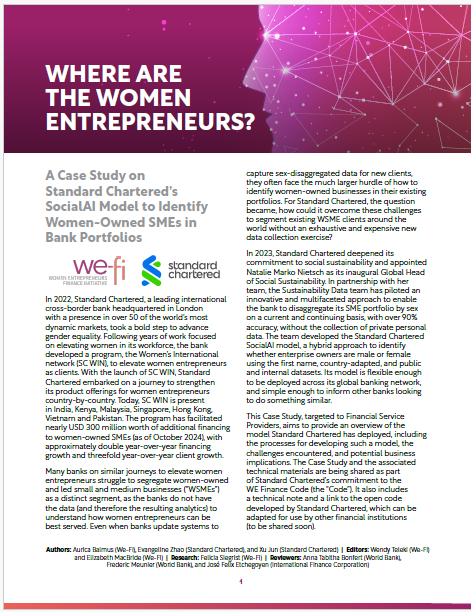Co-organized by:
Wednesday, January 22 | 8:00 – 09:30am EST
In October 2023, the Women Entrepreneurs Finance Initiative (We-Fi) launched the WE Finance Code (or simply, the Code), a global framework designed to drive commitment, leadership, and innovation to close the gender financing gaps and enable women to succeed as entrepreneurs. Closing the WMSME finance gap requires a data-driven approach, yet collecting sex-disaggregated data (SDD) remains a significant challenge for Financial Service Providers (FSPs). These challenges include defining Women’s Entrepreneurship, overcoming operational hurdles, and addressing a lack of prioritization by both the private and public sectors.
Case Study:
Links:
- Case Study: Banco BHD León Uses Women-Centered Design to Grow Its Market in the Dominican Republic – World Bank
- Executive Briefing: The Business Case for Gender-Smart Solutions in the Private Sector – IFC
- Women Entrepreneurs Open a Path for Digital Financial Services in the Democratic Republic of Congo – IFC
8:05 – 8:15 Opening Remarks by Natalie Marko (Head of Social Sustainability, Standard Chartered)
- Why did Standard Chartered decide to focus on sex-disaggregating its data?
- How were challenges in collecting gender data addressed?
- What are the lessons learned?
-
Moderator: Aurica Balmus (We-Fi)
- Frederic Meunier (World Bank)
- Jose Felix Etchegoyen (IFC)
-
Natalie Marko / Evangeline Zhao (Standard Chartered)
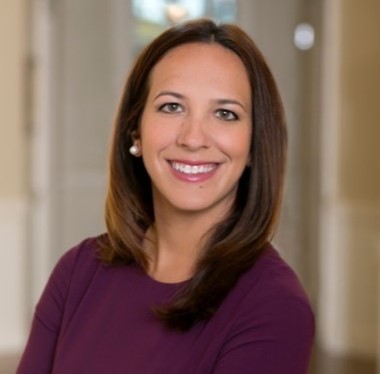
Natalie Marko Nietsch, Managing Director, Head of Social Sustainability, Standard Chartered Bank
Natalie is a Managing Director and the Head of Social Sustainability for Standard Chartered Bank (“SCB”). She works closely with bank’s institutional, corporate, retail, and wealth clients to maximize social impact across the markets and communities where SCB operates. Through new product innovation, blended finance contributions, and commercial partnerships, Natalie mobilizes diverse sources of capital to support of social outcomes. Her focus areas include economic inclusion, gender equality, hunger and food security, quality of living (access to clean water, sanitation, energy, internet), access to healthcare, access to education, and affordable housing. To integrate a focus on social sustainability across the bank, Natalie also sits on the firm’s Global Sustainability Leadership Team.
Natalie has worked for nearly twenty years in global markets with extensive experience in client coverage, structuring, technology, and strategy. Prior to her appointment as the Head of Social Sustainability, Natalie led several projects focused on financial inclusion, gender equality, and privacy and data security across the bank. She is passionate about advancing Women’s Economic Empowerment, specifically around access to banking. Natalie designed and launched the bank’s first dedicated product for women-owned businesses, SC WIN, to improve access to financing to women-run small businesses in Asia and Africa. Natalie sits on several external boards and committees focused on women’s economic empowerment and is also a member of the Milken Institute’s Young Leaders Circle.
Natalie is a 2007 graduate of the Red McCombs School of Business at the University of Texas in Austin with a degree in Finance. She lives in Singapore with her husband, Eric, and two young boys, Jackson and Cameron.
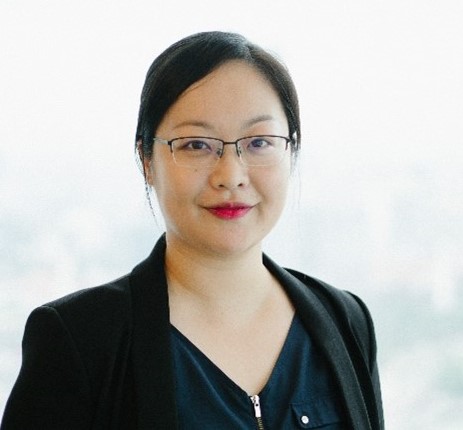
Evangeline Zhao, Executive Director, Strategic Initiatives, Sustainable Finance, Standard Chartered Bank
Evangeline works as an Executive Director, Strategic Initiatives from Sustainable Finance, Standard Chartered Bank (“SCB”). Evangeline is a strategic leader with a deep commitment to sustainability, focused on crafting and executing strategies that drive meaningful change. Combining business acumen with cutting-edge technology, Evangeline developed and executed a comprehensive sustainability data strategy to position the bank as a leader in digital-led sustainability, solve the sustainability data challenge including supporting Net Zero commitments and integrating climate risk considerations into business decision-making, enabling sustainability disclosures and reporting, and supporting revenue growth in sustainable finance.
Her seventeen years’ expertise spans Sustainability/Sustainable Finance, Client Due Diligence (AML/KYC), Regulatory Reporting and Disclosures, Portfolio Management, Advanced Data Analytics, BI/DW, ERP systems, Cloud Solutions, Business Process Improvement, and Enterprise Service Management. Evangeline is passionate about making sustainability a powerful force for innovation and business growth.
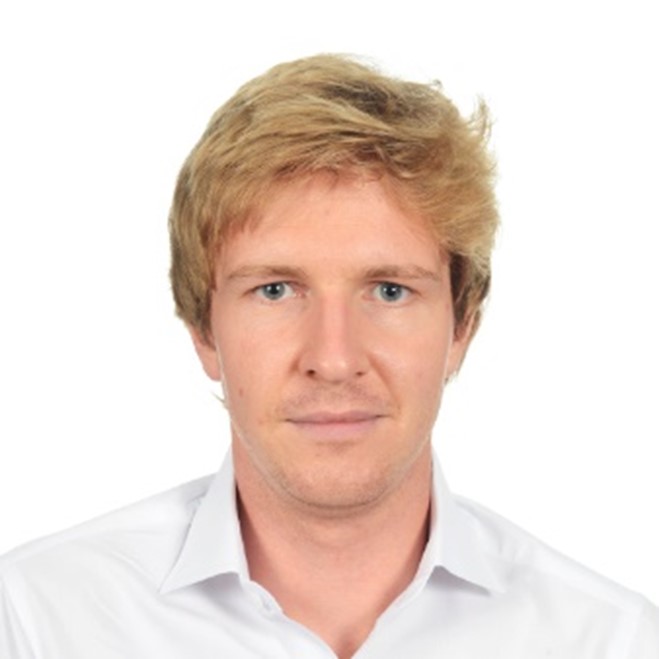
Frederic Meunier, Senior Economist, World Bank
Frederic Meunier joined the World Bank in 2009 and works as Senior Economist in the Investment Climate Department. His experience spans business entry, entrepreneurship, and property rights. He currently leads the Entrepreneurship database project – which measures trends in entrepreneurship around the world, with a lens on gender disaggregated data.
He holds a master’s degree in economics from the College of Europe (Belgium) and a master’s degree in international business from ESSEC business school (France).
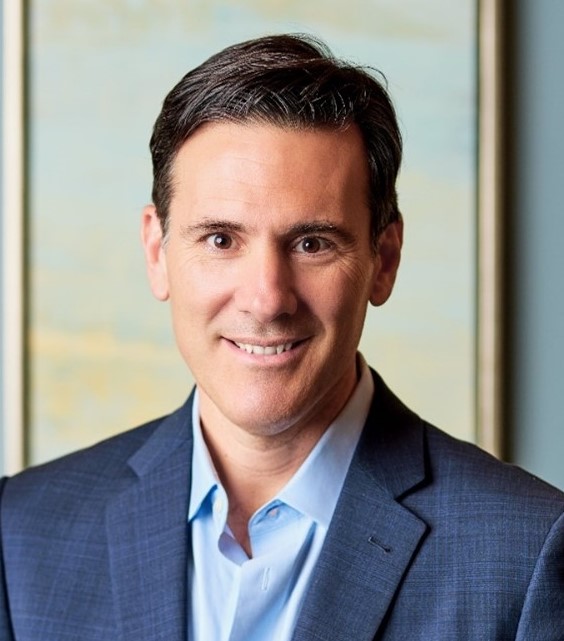
Jose F Etchegoyen, Sr Global Specialist Gender Finance, Financial Institutions Group
José has over 25 years of experience in international banking and emerging markets, focused on unbanked or underserved populations. Currently at IFC, he leads advisory services, product development and strategy for the Banking on Women business line in ELAC. He also supports investment transactions with focus on Gender Finance and Financial Inclusion which resulted in a women portfolio increase from $600M to about $4b.
Jose leads projects across two continents with a focus on SME, gender finance, diversity, and inclusion. Jose supports banks in the structuring and launching of value propositions focus on sales approach, credit underwriting processes and non-financial services for middle market, SME, and micro segments. As a member of IFCs FIG Global team, Jose leads IFCs Data, Risk and Regulation and Gender Global Practice Groups to ensure the adherence to best practices across MSME banking, gender finance, data and analytics.
Prior to joining IFC, he served as Director of Financial Services at PricewaterhouseCoopers Advisory Services in Washington D.C. and Principal Banking Solutions Specialist at SAS Institute in Miami, Florida. He also worked in leading FIs in the USA. and Latin America such as Citibank and Banco Santander. José holds a Master of Business Administration (MBA) in International Business Strategy and Finance from the Kellogg School of Management (Chicago, USA) and a Licenciatura en Administracion from Universidad Nacional de La Plata (Argentina).
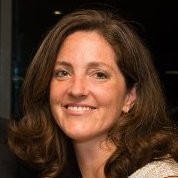
Wendy Teleki, Head of the We-Fi Secretariat
Wendy Teleki is Head of the We-Fi Secretariat, which is housed in the World Bank Group. The Secretariat is responsible for supporting the We-Fi Governing Committee in the allocation and supervision of We-Fi funding as well as communications, advocacy, and learning focused on strengthening opportunities for women entrepreneurs in collaboration with the GC, Implementing Partners and other stakeholders.
Ms. Teleki joined We-Fi in May 2019. Prior to that, Ms. Teleki worked with the International Finance Corporation leading numerous activities and initiatives focused on small and medium enterprise development in emerging markets around the world. This included several blended finance, investment and advisory programs, including IFC’s We-Fi program and the Global SME Finance Initiative.
Wendy has an MBA in Finance from the Wharton School of Business and an MA in International Economics from the Johns Hopkins School of Advanced International Studies.
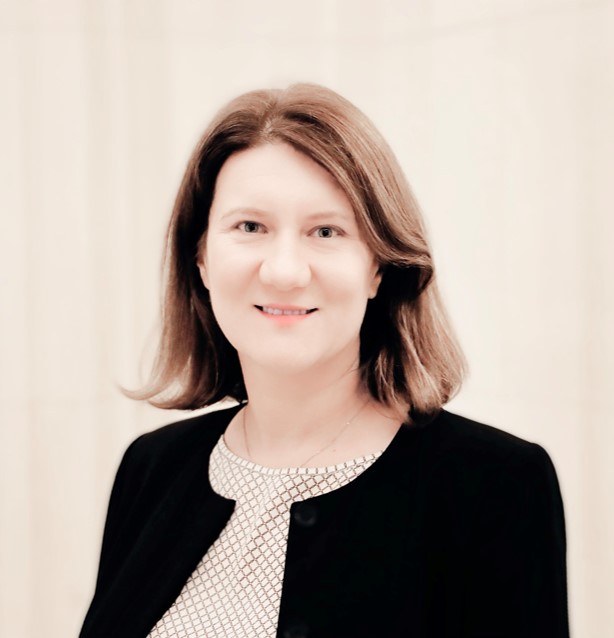
Aurica Balmus, Principal, Gender & Economic Inclusion, EBRD
Aurica is Principal in the Gender & Economic Inclusion team at the EBRD, leading the roll-out of the WE Finance Code in 14 countries across Central Asia, the Western Balkans, and SEMED. This global initiative brings together regulators, financial service providers, development banks, and other financial ecosystem players to enhance financial inclusion for women entrepreneurs. Previously, Aurica was Senior Program Officer at the We-Fi Secretariat at the World Bank, coordinating with We-Fi Implementing Partners on delivering activities, tracking progress, measuring impact, and identifying lessons learned. Prior to that, she spent 5 years at IFC in the Blended Finance Department and Financial Institutions Group, supporting initiatives that enhance access to finance to SMEs and women-owned business. She also has 8 years of consulting experience with financial institutions on increasing access to finance.

